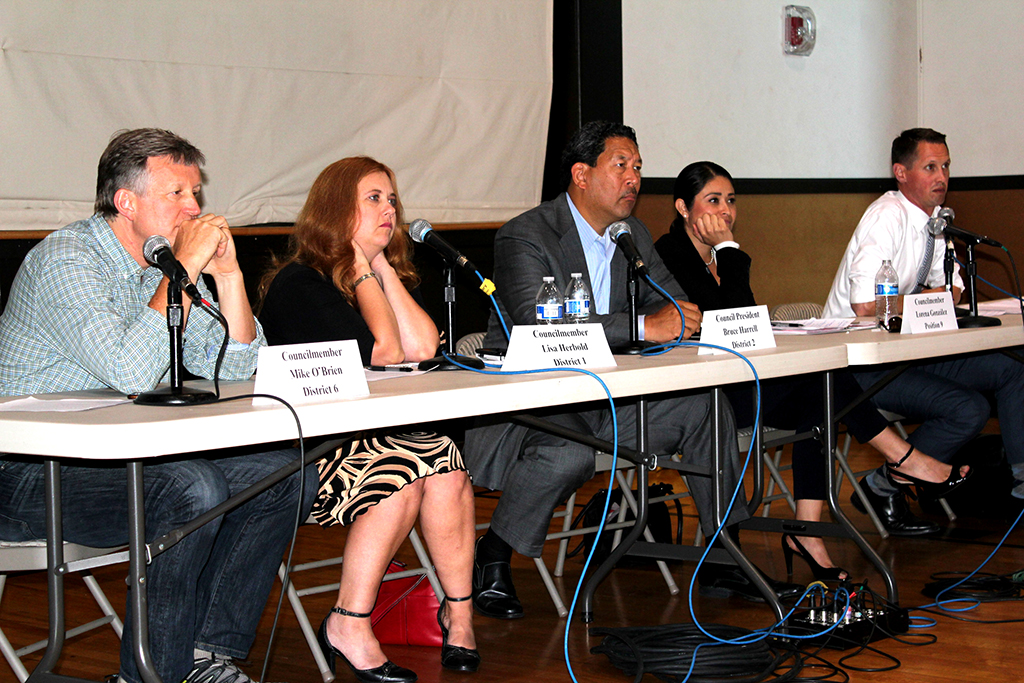By James Tabafunda
Northwest Asian Weekly

Members of Seattle’s planning, land use, and zoning committee, from left: Seattle City Councilmembers Mike O’Brien, Lisa Herbold, Bruce Harrell, Lorena Gonzalez, and Rob Johnson (Photo by James Tabafunda/NWAW)
The City of Seattle’s idea of preventing displacement and fostering equitable communities in Chinatown International District (CID) differs from the vision shared among its low-income residents.
Mandatory Housing Affordability (MHA) legislation allows developers to build 170-foot tall buildings in the CID, an increase of 20 feet from the current 150-foot limit that would upzone the neighborhood by two stories.
More than 200 CID stakeholders gathered at the Nisei Veterans Committee Memorial Hall on July 18 to urge city leaders to do more to help CID residents, nonprofits, and businesses avoid eviction. The town hall, called “We Shall Not Be Moved,” gave stakeholders in Chinatown, Nihonmachi (Japantown), and Little Saigon the opportunity to share specific concerns and needed changes to the proposed zoning change.
City Councilmembers Mike O’Brien, Lisa Herbold, Bruce Harrell, Lorena Gonzalez, and Rob Johnson listened to scheduled presentations and public comments during the planning, land use, and zoning committee meeting. Cantonese, Vietnamese, and Mandarin interpreters were also present.
Councilmember and Committee Chair Johnson said, “We have proposed no changes, I repeat no changes, to the historic core of Chinatown International [District].”
The city plans to create more than 6,000 more affordable housing units and more business opportunities in the neighborhood over the next 10 years. CID stakeholders claim 640 low-income residents are facing displacement during the neighborhood’s redevelopment.
Gary Johnson, center city coordinator in the city’s Office of Planning and Community Development (OPCD), says the city will focus on five areas.
“One will focus on addressing both the concerns over commercial and retail displacement and residential displacement. Another will look at ways to provide the community greater opportunities to have input on new buildings, new projects.”

Teizi Mersai, Lam’s Seafood Market business operations manager (Photo by James Tabafunda/NWAW)
Making city-owned land available to the community for affordable housing is also being considered.
“Another committee will look at large city and other governmental projects and emphasize coordination to minimize the impact of these projects on the neighborhood,” Johnson said. “And finally, another group will look at ways to improve parks and streetscapes and the pedestrian environment in general.”
Sara Maxana, also with the OPCD, says the city knows CID residents are very concerned about displacement as the community grows.
“Seattle is very expensive, and we cannot build enough housing fast enough. The city shares that concern,” she said.
“By allowing a little bit more height with MHA, we can require the developers build affordable housing in their projects or contribute to an affordable housing fund that lets the city invest in projects such as InterIm Hirabayashi Place.”
She says tenants currently living in CID affordable housing do not need to worry about significant rent increases and displacement.
“This proposal is essential to helping to meet our goals and our needs, to help Seattle community members stay in Seattle,” Maxana said.
The floor was then open to CID residents and supporters.
Tom Im, community development and sustainability director at InterIm Community Development Association, said, “Though we are supporters of inclusionary requirements, which is the central element in the MHA legislation, we do not believe that this legislation does enough to address the development pressures and associated displacement fears that this neighborhood is facing right now.”
The CID’s anti-displacement plan includes community-controlled land within the next 10 years, more resources that help people stay in the neighborhood, affordable commercial spaces, and public space additions.
Dozens of pleas — delivered with passion, some not in English – and pro-social-justice protests followed Im’s presentation during public comments with each speaker given only two minutes.
Jacqueline Wu, Seattle chapter president of the OCA–Asian Pacific American Advocates, approached the microphone as the fifth registered speaker.
Holding a sign in her left hand with the message “REDLINE OUT DISPLACEMENT” in large white letters on a red background, she said, “We ask that there be a pause to any development in Chinatown International District for the city to properly engage and work with the community so that all parties can reach an outcome that is mutually agreeable, that there be city transparency and accountability. The current MHA does not address displacement and existing affordable housing units that are unaffordable.”
“Please listen. Engage whether it’s for housing development, street improvements, fighting graffiti, any concerns in the neighborhood, we need you to make the decisions, the good decisions for us,” said Teizi Mersai, Lam’s Seafood Market business operations manager.
“We alone cannot make changes. They will make changes for us, but we must make them make changes for us. You have to listen when we do come to you.”
Friends of Little Saigon Board Chair Quynh Pham said to the five council members, “We’ve been voicing our opinions and our issues and challenges, but for some reason, the city is not hearing it.”
“The Friends of Little Saigon would like to support the MHA to move forward because we have developments happening now, and they need to invest in our community as well. Hold them accountable to that.”
The full city council will take action on MHA at City Hall on July 31 at 2:00 p.m.
“I think we’ve heard a lot of very good ideas today,” said Councilmember Johnson.
To view the committee meeting online, visit goo.gl/fTPu5P
James Tabafunda can be reached at info@nwasianweekly.com.



